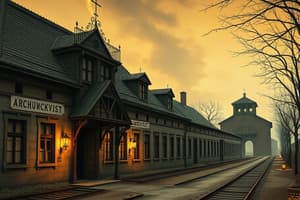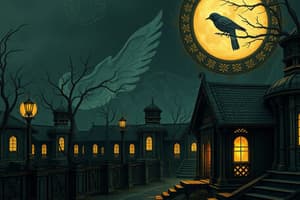Podcast
Questions and Answers
What is the main focus of Elie Wiesel's book 'Night'?
What is the main focus of Elie Wiesel's book 'Night'?
- His philosophical beliefs about peace
- His childhood in Romania
- His personal experiences during World War II (correct)
- His struggles after winning the Nobel Peace Prize
When was Elie Wiesel awarded the Nobel Peace Prize?
When was Elie Wiesel awarded the Nobel Peace Prize?
- 1986 (correct)
- 1928
- 1944
- 1956
Which country annexed the part of Romania where Elie Wiesel was born in 1928?
Which country annexed the part of Romania where Elie Wiesel was born in 1928?
- Poland
- Hungary (correct)
- Germany
- Austria
What motivates Eliezer to give up his gold crown to Franek in the electrical fittings factory?
What motivates Eliezer to give up his gold crown to Franek in the electrical fittings factory?
During a selection process at the camp, what does Eliezer's father give him as his inheritance?
During a selection process at the camp, what does Eliezer's father give him as his inheritance?
What event takes place in the abandoned village where Eliezer and his father stay before being transported to Gleiwitz camp?
What event takes place in the abandoned village where Eliezer and his father stay before being transported to Gleiwitz camp?
What was the reaction of the other prisoners towards Madame Schachter's hysterical behavior?
What was the reaction of the other prisoners towards Madame Schachter's hysterical behavior?
What action did Eliezer take during the selection process by Dr. Mengele at the concentration camp?
What action did Eliezer take during the selection process by Dr. Mengele at the concentration camp?
Why did Eliezer hesitate to recite the Kaddish along with the other prisoners near the pit?
Why did Eliezer hesitate to recite the Kaddish along with the other prisoners near the pit?
What is Eliezer's reaction when his father is dying and calling for water?
What is Eliezer's reaction when his father is dying and calling for water?
How do other prisoners urge Eliezer to deal with his dying father?
How do other prisoners urge Eliezer to deal with his dying father?
What significant event occurs at Buchenwald on the day the prisoners are supposed to evacuate?
What significant event occurs at Buchenwald on the day the prisoners are supposed to evacuate?
How does Eliezer describe his emotional state after his father's death?
How does Eliezer describe his emotional state after his father's death?
What is Eliezer's reaction when he sees his father's body has disappeared the next day?
What is Eliezer's reaction when he sees his father's body has disappeared the next day?
How does Eliezer finally react when he sees himself in front of a mirror after liberation?
How does Eliezer finally react when he sees himself in front of a mirror after liberation?
Flashcards are hidden until you start studying
Study Notes
Focus of 'Night'
- 'Night' recounts Elie Wiesel's harrowing experiences as a Jewish prisoner in Nazi concentration camps during the Holocaust.
- It explores the horrors of genocide, the loss of faith, and the struggle for survival in the face of inhumanity.
Nobel Peace Prize
- Elie Wiesel was awarded the Nobel Peace Prize in 1986 for his work as a writer and human rights activist, particularly for his "message of peace, reconciliation and human dignity."
Annexation of Sighet
- The part of Romania where Elie Wiesel was born in 1928, Sighet, was annexed by Hungary in 1940.
Giving Up the Gold Crown
- Eliezer gives up his gold crown to Franek, a Kapo, in exchange for protection for himself and his father in the electrical fittings factory.
- Franek's power over them makes Eliezer desperate to secure their safety.
Father's Inheritance
- During a selection process at the camp, Eliezer's father, fearing he might not survive, gives him his inheritance — his spoon — as a symbol of his love and a reminder of their shared bond.
Abandoned Village Event
- In the abandoned village where Eliezer and his father are held before being transported to Gleiwitz, a chaotic scene unfolds as the prisoners desperately search for food and water.
- The prisoners experience a surge of hope when they find a few potatoes, only to see them taken away by the Ukrainians guarding the camp.
Madame Schachter's Behavior
- While on the train to Auschwitz, Madame Schachter, a fellow prisoner, has disturbing visions of fire and flames.
- The other prisoners are initially dismissive or annoyed by her hysterical behavior, attributing it to her madness.
- Eventually, Madame Schachter's premonition of a burning crematorium comes true, leading to a chilling confirmation of the reality of their situation.
Eliezer's Action During Selection
- During a selection process by Dr. Mengele at the concentration camp, Eliezer pretends to be older and stronger than he is, hiding his weakness and illness to avoid being sent to the gas chambers.
- He is motivated by a desperate instinct for survival and the fear of losing his father.
Hesitating to Recite Kaddish
- Eliezer hesitates to recite the Kaddish, a Jewish prayer for the dead, with the other prisoners near the pit where bodies are thrown.
- His reluctance stems from a shrinking belief in God's presence in the face of cruelty and his own struggle with the loss of faith caused by the suffering he witnesses.
Eliezer's Reaction to His Father's Death
- As his father is dying and yearning for water, Eliezer feels a mix of despair and fear.
- He is overwhelmed by his own struggles for survival and struggles to comfort his ailing father, feeling detached and powerless in the face of his father's suffering.
Prisoners' Urging to Deal With Dying Father
- Other prisoners urge Eliezer to "throw away" his dying father, suggesting he leave him behind to ease his own burden.
- The harshness of camp life forces them to prioritize survival, emphasizing a brutal reality where compassion can become a liability.
Significant Event at Buchenwald
- On the day the prisoners are supposed to evacuate Buchenwald, they are suddenly and unexpectedly freed by Allied forces.
- This unexpected event signifies a shift in power and brings a sense of liberation.
Eliezer's Emotional State After His Father's Death
- Following his father's death, Eliezer experiences a profound sense of emptiness and numbness.
- He struggles to process the loss and feels disconnected from his own emotions, marking the deepening of his disillusionment and isolation.
Eliezer's Reaction to Seeing His Father's Body
- Upon discovering that his father's body has disappeared from the camp, Eliezer confronts the finality of death and the destruction wrought by the Nazis.
- The disappearance represents a symbol of the total loss he has experienced and a sense of helplessness in the face of his father's absence.
Eliezer's Reaction in the Mirror
- When Eliezer finally sees himself in a mirror after liberation, he is repulsed and shocked by his changed appearance.
- Years of starvation and suffering have taken a toll on his physical and emotional well-being, forcing him to confront the devastating impact of his experience.
Studying That Suits You
Use AI to generate personalized quizzes and flashcards to suit your learning preferences.




